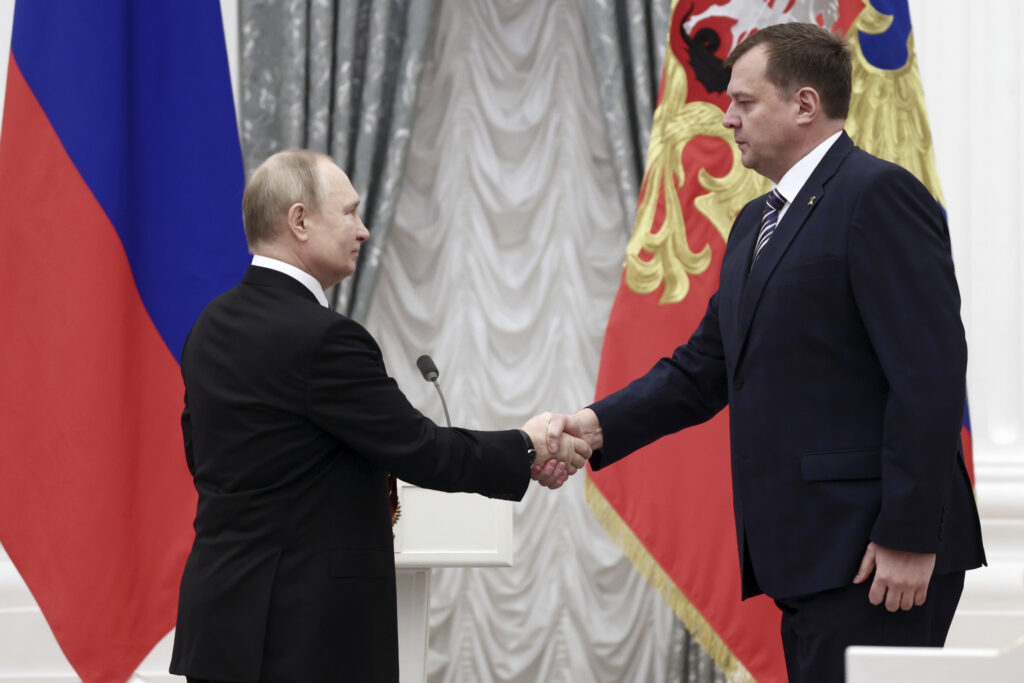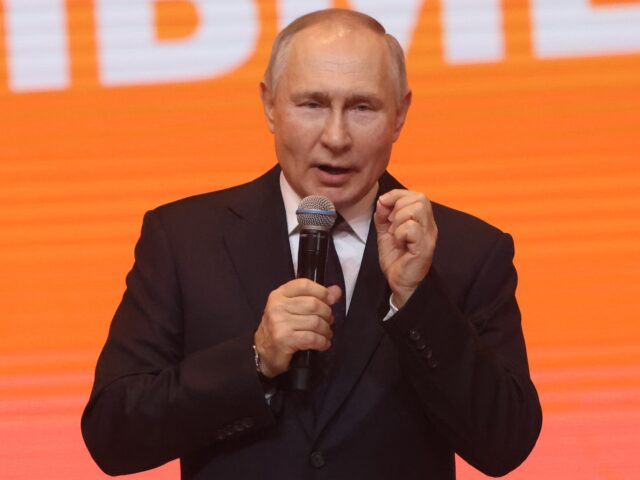Russian leader Vladimir Putin used the occasion of Security Agency Worker’s Day, a Russian holiday to honor spies and intelligence agents, on Tuesday to urge them to focus on the threats of “traitors” at home.
Putin emphasized the importance of intelligence operations in the four regions of Ukraine that he “annexed” in September – Donetsk, Luhansk, Kherson, and Zaporizhzhia – claiming “Russia’s new regions” were demanding expanded Russian government operations to end the nearly nine-year-old war there. The Russian leader made his remarks in a video message amid a visit to Belarus, a neighboring ally state that Western observers have feared may soon become kinetically involved in the Ukrainian conflict.
Putin first invaded Ukraine in 2014, colonizing its southern Crimean peninsula, and later fueled a proxy war in the Donbas region (Donetsk and Luhansk) for the better part of eight years.
In February, he announced a “special operation” to oust the democratically elected government of Ukrainian President Volodymyr Zelensky, which he labeled an illegitimate “Nazi” regime on the grounds that, in 2014, a popular revolt removed former President Viktor Yanukovych. Zelensky defeated Yanukovych’s successor, Petro Poroshenko, in an election Poroshenko did not contest to become president in 2019.
Russian troops have managed to contain the war within Ukraine but Putin has faced stiff civilian resistance at home. Thousands of Russians have participated in protests in the country’s major cities since February, forcing mass arrests and prompting Putin to stage concerts and other events in an attempt to pacify his people.
Speaking on video to the country’s intelligence agents, Putin indicated a heightened need to be on alert for threats at home from foreign actors and “traitors.”

Russian President Vladimir Putin, left, awards Moscow-appointed head of Russian-controlled Zaporizhzhia region Yevgeny Balitsky with the order “For Merit to the Fatherland” of the third class during an awarding ceremony at the Kremlin’s St. Catherine Hall in Moscow, Russia, Tuesday, Dec. 20, 2022. (Valeriy Sharifulin, Sputnik, Kremlin Pool Photo via AP)
“Fighting terrorism remains one of the key priorities for all security services, first of all, the Federal Security Service. You have vast experience in countering terrorism; therefore, it is necessary to continue the efforts to prevent terrorist attacks in a system-wide and consistent way,” Putin advised, according to a Kremlin translation of his address. “Crowded places, strategic facilities, as well as transport and energy infrastructure must be under special control.”
“The counterintelligence agencies, including the military ones, need to show utmost readiness and concentration,” he continued. “It is necessary to put a firm stop to the activities of foreign special services, and to promptly identify traitors, spies and diversionists.”
Putin urged special agents to focus particularly on operations within occupied Ukraine.
“I would like to call attention to the security agency units that have begun their work in Russia’s new regions,” the president said, “Yes, you are faced with difficult tasks now: the situation in the Donetsk and Lugansk people’s republics, and the Kherson and Zaporozhye regions is extremely complicated.”
EU Commissioner Warns Russia May Be Trying to Flood Europe with Ukrainian Refugees https://t.co/1ue2celzvH
— Breitbart London (@BreitbartLondon) December 10, 2022
“But the people who live there, Russian citizens are counting on you and your protection,” he asserted. “And your duty is to do everything in your power to ensure their safety and respect for their rights and freedoms. On our part, we will continue to supply the new units with modern equipment and weapons, as well as experienced personnel.”
Putin did not name any particular terrorist groups or attacks that concerned him, either in the Donbas or in Russia. The country has experienced a series of strange events, however, that government officials have yet to fully explain – including two massive fires in Moscow malls this month yet to be explained. On Tuesday, authorities confirmed another bizarre explosion destroying parts of a gas pipeline connecting Siberia to Ukraine.
Local officials said on the Telegram messaging app that one person had been injured and the flow of gas through the section of the pipeline had been cut as of 1:50 p.m. (1050 GMT),” Reuters reported. “The Chuvashia regional Emergencies Ministry said the pipe had been severed near the village of Kalinino, about 150 km (90 miles) west of the Volga city of Kazan, and that the gas flare had now been extinguished.”
Protests have also been a cause for concern for the Russian government. Residents in Moscow, St. Petersburg, and other major cities took the streets in February urging Putin to reconsider the “special operation” against Zelensky. In September, a new wave of protests against the invasion of Ukraine resulted in at least 1,200 arrests.
Russia has once again halved Germany’s gas supply, a move that will further harm an already struggling EU economy. https://t.co/WMCm3wOAwh
— Breitbart News (@BreitbartNews) July 26, 2022
Putin’s address to the nation’s spies on Tuesday aired on Russian television as he made a rare international visit to ally Alexander Lukashenko of Belarus, during which Lukashenko heaped lavish praise on Putin and expressed some nostalgia for the fallen Soviet Union, warning that the two countries must “avoid at all costs the mistakes that were made after the collapse.”
“As Mr Putin and I often say, Russia and Belarus are open to dialogue with other countries, including European countries,” Lukashenko claimed, without elaborating. “I hope that they will soon heed the voice of reason, and we will begin a constructive discussion of security for all and the future international order.”
Meeting with Lukashenko, Putin thanked Belarus for being a “good neighbor” with mutual interests and “definitely our ally in the most direct sense of the word,” an apparent reference to Belarus’s support for the invasion of Ukraine. Putin celebrated following his meeting with Lukashenko that the two are working together to “minimize the impact” of Western sanctions on both of their economies in response to human rights violations against their own citizens and, in Russia’s case, against Ukrainians.
“I can say that we are doing this confidently and efficiently,” Putin vowed.

COMMENTS
Please let us know if you're having issues with commenting.